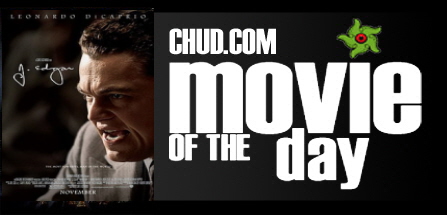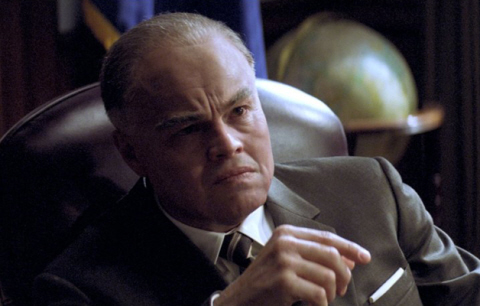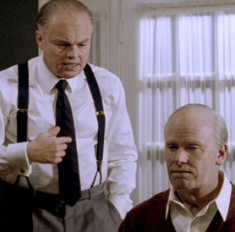
The Film: J. Edgar (Buy it from CHUD)
The Principles: Clint Eastwood (director), Leonard DiCaprio, Naomi Watts, Armie Hammer
The Premise: Eastwood profiles one of the most divisive figures in American history in the form of J. Edgar Hoover (DiCaprio). The film chronicles Hoover’s rise from pencil pusher in the Justice Department to founder and figurehead of the Federal Bureau of Investigation. While Clint is hesitant to condemn Hoover’s morality, he’s quick to explore the man’s person relationships. Secretary Helen Gandy (Watts) and confidant Clyde Tolson (Hammer), rumored for ages to have been Hoover’s romantic counterpart, are featured prominently in this in-depth character study.
Is It Good: Patience is a virtue in late-period Eastwood work. That’s no different with his latest effort, a film that handles Hoover’s career with kid gloves while lending a fictionalized account of the man’s personal life. Eastwood tells a very dry, by-the-numbers story that is every bit as restrained as the focal character of the film. DiCaprio again knocks it out of the park in a biopic, even if the makeup that ages him is subpar and pulls you out of the picture at times. Eastwood’s go-to cinematographer Tom Stern bathes the film in drab greys that emulate the stodginess one expects to find in bureaucratic office life.

J. Edgar has trouble connecting on account of its refusal to take any sort of stance on Hoover, the professional. Eastwood and screenwriter Dustin Lance Black (Milk) have no issue filling in the blanks regarding their subject’s sexuality, but his politics and alleged corruption are skirted. The film pegs Hoover as a repressed man, both emotionally and sexually. Tolson is clearly his lover, but they never engage physically aside from a single, forced kiss. Professionally, Hoover comes off as a victim of his own eccentricities and paranoia moreso than being morally corrupt (when the truth is likely somewhere in between).
Still, Hoover’s credited with as much as he’s condemned for historically – his work lead to the advancement of criminal science and techniques that are still very much employed today. But reluctance on the part of the filmmakers to take a hardline on the man leads to a rather rudimentary biopic; one that’s engaging but ultimately forgettable.
Is it worth a look: History buffs will find a lot to like, and the film works as a great companion piece for De Niro’s The Good Shepherd (if you have five hours to kill). More than anything, I realized how little I knew about Hoover even after seeing the film. Appropriate, given Hoover’s predisposition to secrecy. Everything regarding Hoover’s alleged relationship with Tolson is of course fictionalized and pieced together through hearsay and what we know of history. This is Eastwood at his most restrained, when the film really needed a powerful voice behind the lens. It’s apolitical; a missed opportunity unbecoming of such a controversial historical figure.
 Random Anecdotes: We’ll never know if Hoover and Tolson were in the business of getting busy. But their relationship was undeniably close. Upon Hoover’s passing he left the entirety of his estate to Tolson, who even accepted the flag draped over his casket. Tolson resided in Hoover’s home until his death in 1972, at which point he was buried a few yards from his lifelong companion.
Random Anecdotes: We’ll never know if Hoover and Tolson were in the business of getting busy. But their relationship was undeniably close. Upon Hoover’s passing he left the entirety of his estate to Tolson, who even accepted the flag draped over his casket. Tolson resided in Hoover’s home until his death in 1972, at which point he was buried a few yards from his lifelong companion.
Cinematic Soulmates: The Good Shephard, Nixon, W., Absolute Power, Priscilla: Queen of the Desert